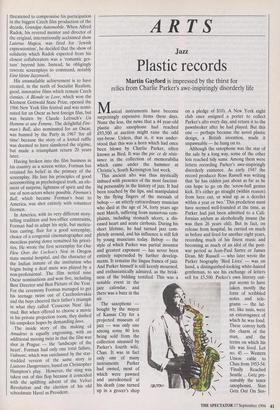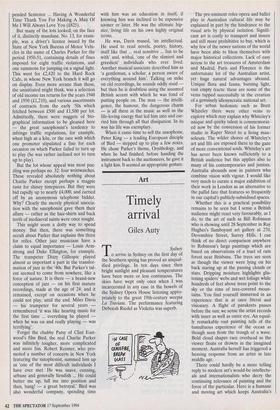ARTS
Jazz
Plastic records
Martin Gayford is impressed by the thirst for
relics from Charlie Parker's awe-inspiringly disorderly life
Musical instruments have become surprisingly expensive items these days. None the less, the news that a 44 year-old plastic alto saxophone had reached £93,500 at auction might raise the odd eye-brow. Unless, that is, it was under- stood that this was a horn which had once been blown by Charlie Parker, often known as Bird. It was the pie' ce de resis- tance in the collection of memorabilia which came under the hammer at Christie's, South Kensington last week.
This ancient alto was thus mystically imbued with presence of the most fascinat- ing personality in the history of jazz. It had been touched by the lips, and manipulated by the flying fingers of the messiah of bebop — an utterly extraordinary musician who died at the age of 34, forty years ago next March, suffering from numerous com- plaints, including stomach ulcers, a dis- eased heart and acute cirrhosis. During his short lifetime, he had turned jazz com- pletely around, and his influence is still felt by young musicians today. Bebop — the style of which Parker was partial inventor and greatest exponent — has never been entirely superseded by further develop- ments. It remains the lingua franca of jazz. And Parker himself is still keenly mourned, and enthusiastically admired, as the brisk- ness of the bidding testified. This was a notable event in the jazz calendar, and there was a buzz in the air.
The saxophone bought by the mayor of Kansas City for a projected museum of jazz — was only one among some 80 lots being sold from the collection amassed by Parker's fourth wife, Chan. It was in fact only one of many instruments Parker had owned, most of which were pawned and unredeemed at his death (one turned up in a grocer's shop on a pledge of $10). A New York night club once assigned a porter to collect Parker's alto every day, and return it to the pawnbroker after he had played. But this one — perhaps because the novel plastic design, a British invention, made it unpawnable — he hung on to.
Although the saxophone was the star of the sale by a long way, some of the other lots reached tidy sums. Among them were letters recording Parker's awe-inspiringly disorderly existence. As early 1947 the record producer Ross Russell was writing that 'he has ridden just about as far as he can hope to go on the 'screw-ball genius kick. It's either go straight (within reason) from here out, or wind up as a derelict within a year or two.' This prediction must have seemed well-founded at the time, as Parker had just been admitted to a Cali- fornian asylum as alcoholically insane (he was then 26 years old). But in fact, on release from hospital, he carried on much as before and lived for another eight years, recording much of his finest music and becoming as much of an idol of the post- war period as Jean-Paul Sartre or James Dean. Mr Russell — who later wrote the Parker biography 'Bird Lives' — was on hand, a distinguished-looking white-haired gentleman, to see his exchange of letters sell for £5,500. Parker's own literary out- put seems to have taken mostly the form of scribbled notes and tele- grams — the lat- ter, like taxis, were an extravagance of which he was fond. These convey both the charm of the man, and the terms on which his life was lived. Lot — no. 45 — Western Union cable to Chan from 1953-54: `Finally Reached
\ Seattle ... Getz pre- sumably the tenor saxophonist, Stan Getz Out On Sus- pended Sentence ... Having A Wonderful Time Thank You For Making A Man Of Me I Will Always Love You (£825).
But many of the lots looked, on the face of it, distinctly mundane. No. 13, for exam- ple, was a driver's licence issued by the State of New York Bureau of Motor Vehi- cles in the name of Charles Parker for the period 1950-51, containing details of fines imposed for eight traffic violations, and one summons for jumping on a signal light. This went for £2,420 to the Hard Rock Cafe, in whose New York branch it will go on display. Even more arcane than these, the uninitiated might think, was a selection of old income tax returns for the years 1948 and 1950 (£1,210), and various assortments of contracts from the early '50s which fetched between £500 and £1,500 per lot. Admittedly, there were nuggets of bio- graphical information to be gleaned here — the great saxophonist's tendency to infringe traffic regulations, for example, when high as a kite, or the care with which one promoter stipulated a fine for each occasion on which Parker failed to turn up to play (he was rather inclined not to turn up to play).
But the lot whose appeal was most puz- zling was perhaps no. 32: four wristwatches. These revealed absolutely nothing about Charlie Parker except perhaps a magpie taste for shiney timepieces. But they were bid rapidly up to nearly £4,000, and carried off by an anonymous telephone bidder. Why? Clearly the merely physical associa- tion with the saxophonist gave them their allure — rather as the hair-shirts and back teeth of mediaeval saints were once sought.
This might seem a dotty way to spend money. But then, there was something occult about Parker that explains this thirst for relics. Other jazz musicians have a claim to equal importance — Louis Arm- strong and Duke Ellington, for example. The trumpeter Dizzy Gillespie played almost as important a part in the transfor- mation of jazz in the '40s. But Parker's tal- ent seemed to come from nowhere, like a force of nature. It is there — a brand-new conception of jazz — on his first mature recordings, made at the age of 24: and it remained, except on occasions when he could not play, until the end. Miles Davis — his trumpeter for several years remembered 'it was like hearing music for the first time ... everything he played when he was on and really playing — was terrifying'.
Forget the chubby Patsy of Clint East- wood's film Bird, the real Charlie Parker was infinitely tougher, more complicated and more fun. Robert Reisner, who pro- moted a number of concerts in New York featuring the saxophonist, summed him up as 'one of the most difficult individuals I have ever met. He was suave, cunning, urbane and generally fiendish ... He could butter me up, lull me into position and then, bang! — a great betrayal.' Bird was also wonderful company, spending time with him was an education in itself, if knowing him was inclined to be expensive sooner or later. He was the ultimate hip- ster, living life on his own highly original terms.
He was, Davis mused, 'an intellectual. He used to read novels, poetry, history, stuff like that ... real sensitive ... fun to be with' and, withal, 'one of the slimiest and greediest' individuals who ever lived. Another musical associate described him as `a gentleman, a scholar, a person aware of everything around him'. Talking on mike on old recordings, he sounds oddly staid but then he is doubtless using the assumed British accent with which he was fond of putting people on. The man — the intelli- gence, the humour, the dangerous charm — is all there in the music as well as the life-loving energy that led him into and car- ried him through all that dissipation. In its way his life was exemplary.
When it came time to sell the saxophone, Peter King — a leading European disciple of Bird — stepped up to play a few notes. He chose Parker's theme, Ornithology, and when he had finished, before handing the instrument back to the auctioneers, he gave it a light kiss. It seemed an appropriate gesture.



























































 Previous page
Previous page